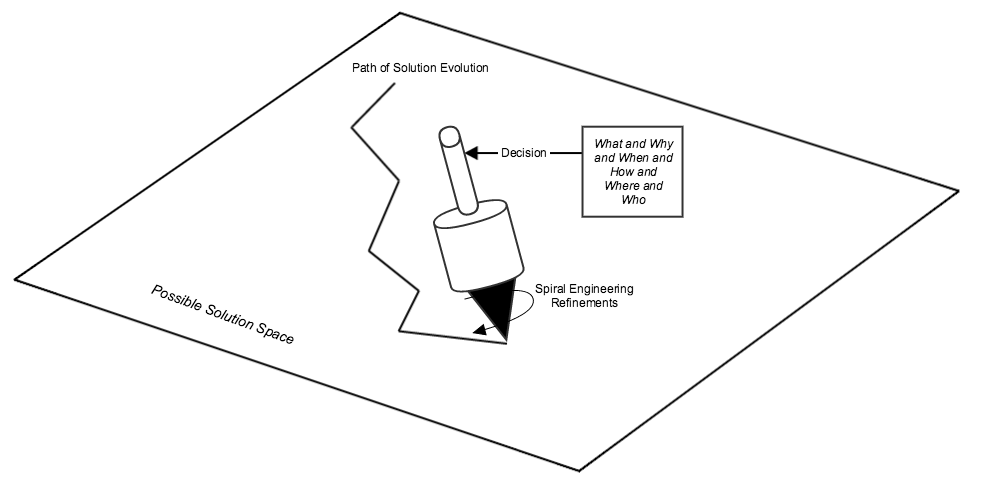Engineering Lifecycle Management.
What a bunch of Rhetoric!
(Submission 2509064)
Lonnie VanZandt, Enterprise Architect, Sodius
A Little Ethos Setting

- Enterprise Architect, Sodius
- (ex) Chief Architect, No Magic
- (ex) UPDM Co-chair
- INCOSE Tools WG Co-chair
- OMG BPMN2 Certified
- OSLC Developer
- IBM Jazz CLM Integration Partner
- PTC Windchill Integration Partner
- Tasktop Sync Partner
- ~30 years Software and Systems Engineering
- 17 years Consulting
- Hobby Ontologist
Introduction
Claim
Motivation
Related Work
Capabilities Sought
Implied Features
Recommendation
Future Work
Paraphrasing Charlton and Adras, management is a process by which managers reflectively model and share a representation of their own processes to enable themselves to perform their eponymous information-processing activities of monitoring, evaluating, predicting, and controlling their enterprise and its systems. [@Charlton2003] Furthermore, managers manage for particular purposes. Purpose-driven, they acquire systems to address the needs of the enterprise and they manage their stakeholders, engineering lifecycle tools, and artifacts during the acquisition processes to attain certain goals.
Introduction

Diocles the Magnesian (circa 150 BC) said, “the Stoics agree to put in the forefront the doctrine of presentation and sensation, inasmuch as the standard by which the truth of things is tested is generically a presentation, and again the theory of assent and that of apprehension and thought, which precedes all the rest, cannot be stated apart from presentation. For presentation comes first; then thought, which is capable of expressing itself, puts into the form of a proposition that which the subject receives from a presentation.
[@Diogenes2013]
Introduction
Logos
Ethos
Pathos
Aristotle claimed that, “the speech that takes place in the assembly is defined as the deliberative species [where] the speaker either advises the audience to do something or warns them against doing something. Accordingly, the audience has to judge things that are going to happen in the future and they have to decide whether these future events are good or bad for the polis.”
[@Rapp2010]
Introduction
Logos
Ethos
Pathos
“I keep six honest serving-men
(They taught me all I knew);
Their names are
What and
Why and
When
And How and Where and Who.”
[@Kipling2009]
Introduction

-
Modern MBSE tools are adequate for modeling once the adequately stable compositions of sufficiently static units of structure and behavior.
-
Systems engineers and managers struggle to use these tools to specify, analyse, present, and manage these models as stakeholders and architects incrementally evolve those models over time and across space.
-
Therefore, engineering lifecycle models management involves more than routine Change Management.
- Rather, management includes the formidable service of providing to decision-making stakeholders the arguments that demonstrate the adequacy of contextually-specific solutions to the enterprise’s problems.
Claim
Whereas
-
Decision-making stakeholders need
dialectical (i.e. logical) arguments
for a proposed system’s satisfaction of constraints such as those that are available from adequately formal modeling notations, solvers, and practices.
-
In addition, they need
rhetorical (i.e. persuasive) arguments
that convince those stakeholders of the aptness of proposals through trust of the proponents and through warrants which appeal to generally accepted grounds.
Claim
Therefore
300,000 hrs
Motivation
Meeting-Based Systems Engineering
is a
Chronic Waste of Time and Money
15%
- HBR “This Weekly Meeting Took Up 300,000 Hours a Year”, reports that modern enterprises spend over 15% of their staff time in meetings. (Mankins, 2014)
- Guardian “Meetings: even more of a soul-sucking waste of time than you thought”, reports that modern meetings foster only decision-making on the most trivial of issues. (Burkeman, 2014)
Motivation
Meeting-Based Systems Engineering
is a Waste
But this undesirable form of "MBSE"
is the symptomatic consequence
of managing enterprises by
neglecting Arguments
and by
focusing on Artifacts.
Related Work
Academia
Standards
Industry
IBM Jazz CLM
JAMA Requirements
NASA JPL OpenMBEE
etc.
Systems Theory
Semantic Web
SAFe
Decision Engineering
etc.
Business Architecture Guild (BizBok)
INCOSE (Tools Interop and MLM WG)
OASIS OSLC
OMG BMM, BPMN, DMN, UPDM, ODM, SBVR

Capabilities Sought
- Manage Identities.
- Assure Information is Accessible to the right Parties.
- Allow Access to Authorized Content; Reject Discovery of Unauthorized Content.
- Provide Retrieval and Persistent Storage of Models, Model Elements, and Model Configuration Items.
- Record and Provide Intentions on Historical Changes in Needs, Constraints, and Solutions.
- Record and Provide Provenance Properties (5W+H) on Curated Model Content.
- Notify Subscribers of Changes to Published Content.
- Compare two or more Graphs of Model Content and Identify Differences at Optional levels of Granularity.
Implied Features
- Business Ontologies Throughout
- Pragmatic Notations for Syntax and Semantics
- Reasoning Across an Open-world Descriptive Logic
-
Automated Provenance-Tracking Relationships
Recommendations
Appreciate the Importance of Decisions

"Spinning Dreidel Lifecycle Model"
Recommendations
Implement Repositories that Automatically Collect Provenance
"Provenance-tracking OSLC Hub"
Recommendations
Logos
Ethos
Pathos
Appreciate that Validation of Solutions requires all of:
a sound Logical verification of the solution,
establishing credibility and trust between the Proponents and Stakeholders,
and empathizing with the Stakeholders and their concerns.
Future Work
Model Lifecycle Management Activity Team within the Tools Interoperability Working Group is Working:
- Elicitation of Issues and Capabilities
- Architecture of a Concept of Operations
- Promotion of Features Sought in Future Generations of Systems
- Specification of Decision Management Tools
- Collaborative Ontology Engineering Environments
- Collaborative Enterprise Architecture Environments
- Evangelization in the Universities and Industries
INCOSE IS 2016 What a bunch of Rhetoric
By Lonnie VanZandt
INCOSE IS 2016 What a bunch of Rhetoric
- 1,858



